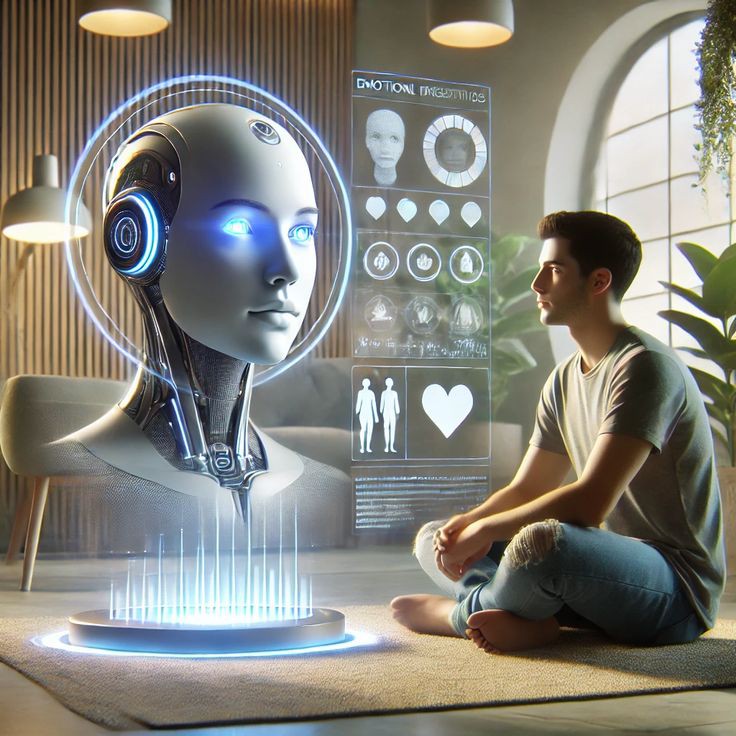AI in mental health: Imagine this: It’s 2 a.m., your mind’s racing, and you’re spiraling into a vortex of anxiety. You don’t want to wake a friend, and booking a therapist feels like a logistical nightmare. But your phone’s right there, so you open an app, type a few words, and a chatbot responds instantly: “Hey, I’m here. What’s going on?” It feels oddly comforting, almost human. This isn’t sci-fi; it’s happening right now. AI-powered chatbots are stepping into the mental health arena, promising support at our fingertips. But here’s the million-dollar question: Can they really replace therapists? Let’s dive in.

AI in mental health: The Rise of the Digital Couch
Ai in mental health: Mental health struggles don’t punch a clock, they hit whenever, wherever. Traditional therapy, while invaluable, comes with hurdles: cost, waitlists, stigma, or just finding the right fit. Enter AI chatbots like Woebot, Replika, and Wysa—digital companions designed to listen, offer coping strategies, and even track your mood. They’re affordable, available 24/7, and don’t judge you for crying over a spilled coffee (or something deeper). In 2025, these tools are smarter than ever, powered by advanced language models that mimic empathy with eerie precision.
Take Woebot, for instance. It’s like a pocket-sized CBT (Cognitive Behavioral Therapy) coach. Studies like one from Stanford in 2023 show it can reduce symptoms of depression and anxiety in just weeks. Users rave about its quirky humor and how it nudges them to reframe negative thoughts. Replika, on the other hand, leans into companionship, building a bond that feels personal. For some, it’s a lifeline when human connection feels out of reach. The numbers back this up: the mental health chatbot market is projected to hit $500 million by 2027, fueled by demand for accessible care.
AI in mental health: The Human Touch: What Chatbots Can’t Fake (Yet)
But let’s not get carried away. Therapy isn’t just about tips and tricks, it’s about connection. A chatbot can’t read the tremble in your voice, the way your shoulders slump, or the silence that says more than words. Therapists bring intuition, years of training, and that indefinable warmth of human presence. When you’re grappling with trauma or complex emotions, a scripted response, no matter how clever, can feel like a band-aid on a broken leg.
I talked to my friend Sarah, a licensed therapist, about this. She laughed and said, “A bot can’t cry with you or call you out when you’re dodging the real issue.” She’s right. AI might nail the science of mental health delivering evidence-based techniques, but it struggles with the art. Empathy isn’t just parroting “I understand”; it’s feeling the weight of someone’s story. And while AI’s getting better at mimicking it, there’s a gap. For now.
The Dark Side of Digital Therapy
There’s a flip side, too. Chatbots aren’t perfect. They can misinterpret nuance, imagine pouring your heart out about a breakup, only for the bot to chirp, “Have you tried deep breathing?” Frustrating, right? Worse, they’re not equipped for crises. If someone’s suicidal, a bot might flag it (if programmed well), but it can’t intervene like a human can.
AI in mental health: Privacy’s another minefield. Your deepest fears, typed into an app, could end up as data points for some tech giant. That’s not paranoia, it’s reality in 2025.
And let’s be real: not everyone’s sold on talking to a machine. For every tech-savvy millennial who loves their chatbot, there’s someone who’d rather spill their guts to a flesh-and-blood listener. It’s a vibe thing.
The Verdict: Replacement or Sidekick?
AI in mental health:
So, can chatbots replace therapists? Not quite. They’re more like super-smart sidekicks, great for quick support, mood tracking, or bridging the gap between sessions. Think of them as mental health first aid: they stabilize you until you can get to the pros. For mild anxiety or loneliness, they might even be enough. But when life gets messy, grief, PTSD, existential crises you need a human in the chair.
Picture this instead: a hybrid future. You chat with an AI to vent daily stress, while your therapist digs into the big stuff biweekly. The bot’s data could even help your therapist tailor sessions. It’s not replacement, it’s revolution. A 2024 survey found 68% of people
are open to this combo, and clinics are already testing it.
Stay updated: Find us on linkdin
The Bottom Line
AI in mental health:
AI chatbots are shaking up mental health, and honestly, it’s exciting. They’re breaking barriers, reaching people who’d never step into a therapist’s office. But they’re not here to steal the show, they’re co-stars, not the lead. The human soul’s too messy, too beautiful, for an algorithm to fully grasp. So, next time you’re up at 2 a.m., go ahead and chat with that bot. Just don’t ditch your therapist’s number. We’re in a brave new world, but some things like a knowing nod across the room still reign supreme. What do you think? Would you trust a bot with your mind?




